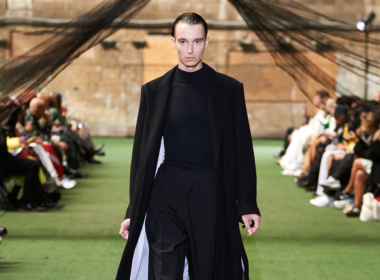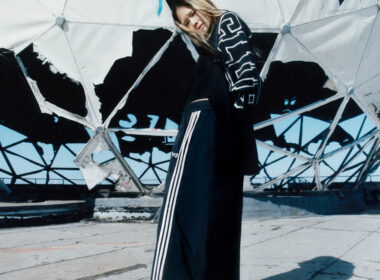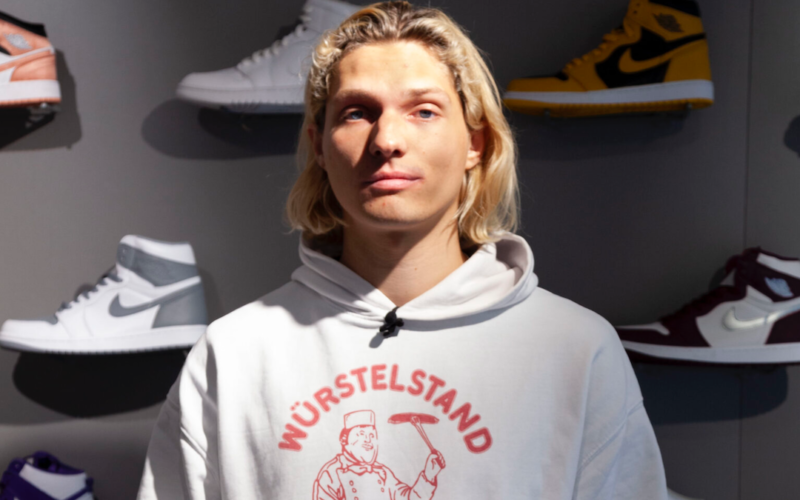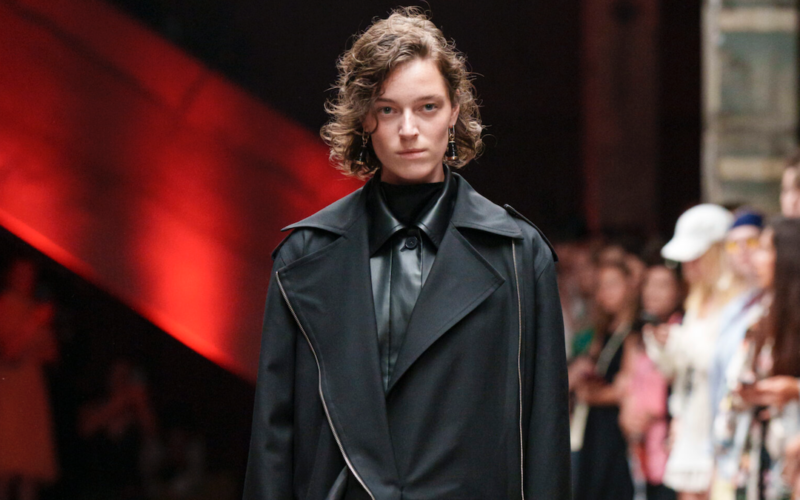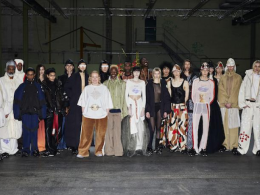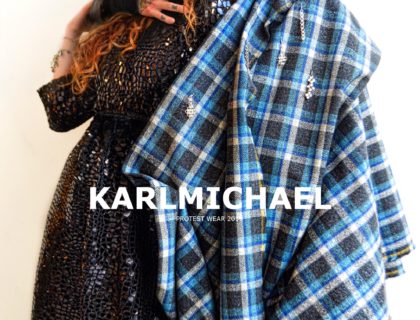Fabian Schumacher’s journey stands as a testament to the power of perseverance and self-belief. From humble beginnings in a German town that seemed worlds away from the realm of fashion, Fabian’s path to entrepreneurship has been marked by challenges and triumphs. In this exclusive interview, we delve into the mind of a visionary who defied stereotypes, transformed sneaker culture, and built a brand that celebrates individuality. Discover Fabian’s unique perspective on fashion, the values that guide his business (Syrup), and his unwavering commitment to fostering a more inclusive industry.
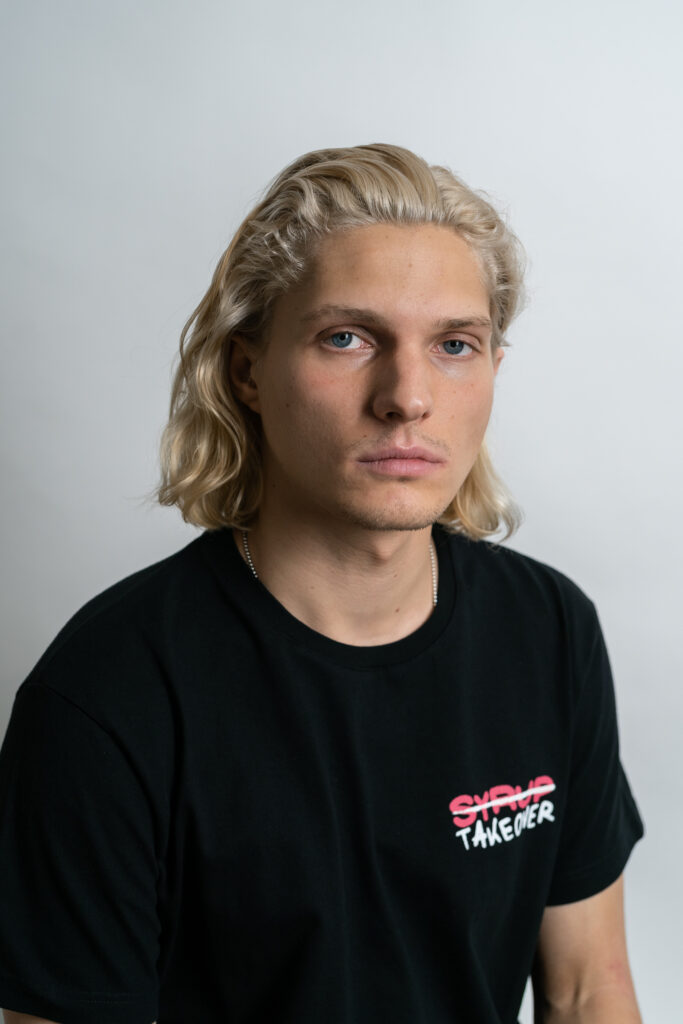
FAB: What inspired you to launch your brand?
Fabian Schumacher: I grew up in a place in Germany that was the farthest from the fashion world one could imagine. The environment I grew up in was very conservative, and being interested in fashion as a man was often seen as feminine or gay, although not necessarily in a negative way. Until I turned eighteen, I had an interest in fashion, but I never expressed it openly, except when I went shopping with my grandmother. I would give her advice on which pieces would look good on her. That was my only connection to fashion. Then, I moved to Vienna to study because I felt that the people around me, both at home in Germany and in my immediate surroundings, didn’t really understand me. I had great friends, but I didn’t feel like I belonged. I was hoping to find my place in Vienna.
One day, I walked into a sneaker store, and they asked me if I wanted to sign up for Yeezys. I declined, saying I didn’t care about Yeezy and didn’t know much about the culture. They asked again to make sure. Although I didn’t personally choose them, some friends of mine did, and they suggested I sell them. In desperate need of cash at the time, I agreed and decided to split the profit with them. This was my first step into the fashion business world. From there, I delved deeper into the culture, developed an understanding, and became more involved with sneakers. I started small, without any budget, by buying and selling shoes. Eventually, I had my own shop where I sold limited-edition sneakers. Young people, aged twelve to twenty-five, who couldn’t afford expensive shoes, would come to the store and show interest, often looking at T-shirts.
In the first shop I worked in, which wasn’t mine, there was a situation where they sold overpriced T-shirts. A kid who couldn’t afford the shoes wanted to be part of the scene, so they settled for buying these T-shirts, even though they weren’t worth the price. That’s when I realised the need to offer affordable options that still gave these kids access to the culture. So, when I opened my own store, I focused on selling merchandise instead of expensive clothing. Merchandise can be sold at a lower price point, making it more accessible. It was important to me to give back to the community and provide an opportunity for young people to participate. That’s how we started rolling out merchandise, and from there, everything else developed.
FAB: What sets your growing sneaker shop apart from other shops in the market?
Fabian Schumacher: That’s a fantastic question because many sneaker shops in the market still haven’t grasped this concept, especially those in the luxury segment. Our primary products are shoes made of leather, plastic, and cotton. These shoes are manufactured for Nike and Adidas for a production cost of only twenty to fifty bucks, while we sell them for thousands. This is what defines luxury. As a result, our store cannot resemble a flea market; it must exude a sense of luxury. When I entered the industry, all the stores looked like flea markets and treated customers as such. They bargained with them, undermined their knowledge of the culture, and pressured them into buying shoes.
We take a different approach. Our shop is designed more like a museum, with the shoes displayed as artwork on the walls. When customers enter our store, we don’t think about selling them the most expensive product; we consider which shoe would best suit their personal style and lifestyle. For example, if a customer has a child, it’s crucial to steer them away from shoes with vibrant colours because they won’t pair well with most outfits. They usually have only one or two pairs of shoes in their closet, and since their feet are still growing, it’s more practical to sell them black and white sneakers or those in neutral colours like grey, blue, or green that can match various outfits. We take these factors into account and approach our customers differently.
Many people’s initial entry into the fashion world starts with sneakers, and it’s our responsibility to guide them and provide them with an opportunity to discover their own fashion taste. If we don’t take this role seriously, there will be many people interested in fashion who may never fully explore it or only do so much later in life. I personally got into fashion quite late, at the age of eighteen, because I didn’t have a store where I could interact with older young adults who were passionate about fashion and treated me with respect. Such a place simply didn’t exist back then. That’s why I believe starting at age eighteen is considered late in the fashion world.
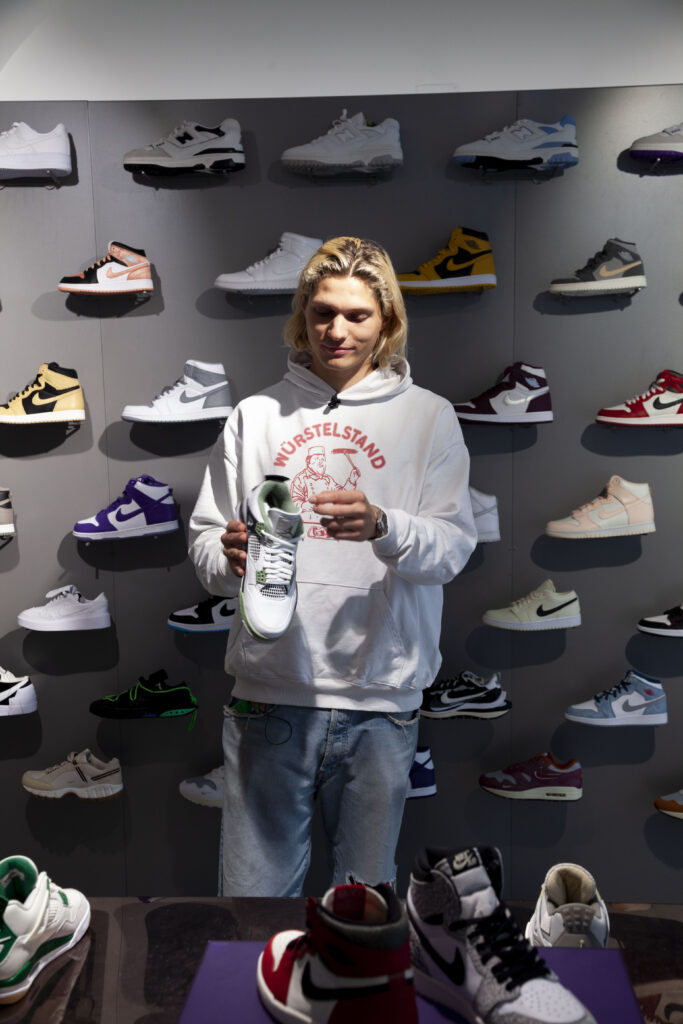
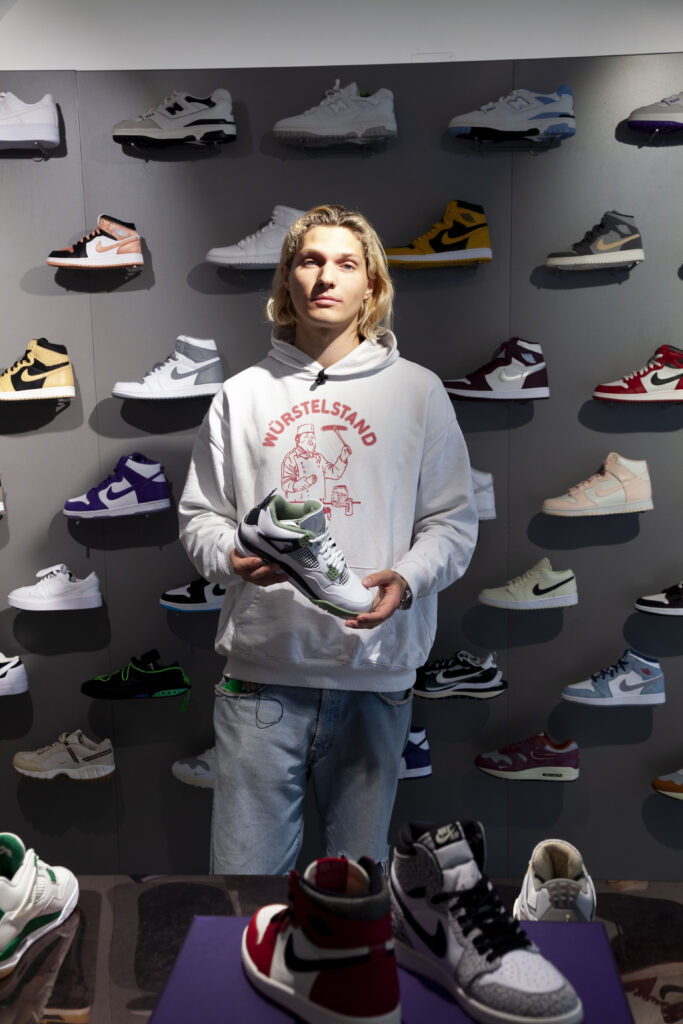
FAB: What has been the biggest challenge you’ve faced so far in your entrepreneurial journey, and how have you overcome these challenges?
Fabian Schumacher: That’s an excellent question, and I’m rarely asked about the difficult times. Most people focus on the positive aspects and the achievements, so I appreciate this question. When I started my journey, I was just eighteen years old. Some people I sold shoes to back then, who unknowingly played a part in my journey, don’t even recognise me now. They didn’t take me seriously because I was too young. It’s only now, at twenty-five, that I’m beginning to earn respect from people who don’t even realise they once bought shoes from me when I was just a kid. That was the initial challenge.
Additionally, I didn’t have much money because we were starting from scratch, and there are numerous corporations with much larger budgets. We had to think creatively to compete with them. Then, in 2019, we opened our first shop, but soon after, the COVID-19 pandemic hit, and we faced lockdowns. As a young company with limited financial reserves, it was challenging to have employees on payroll without any in-store revenue. To overcome this, we shifted our focus to our online shop, investing in advertisements and experiencing a surge in online sales.
From the beginning, it has been a continuous struggle, constantly facing new challenges that catch us off guard. However, we have managed to navigate through them all. I believe we’re on track for a stable year without major challenges. Unless, of course, the unexpected happens, like an alien invasion. But if aliens do arrive on Earth, I think that would be beyond the scope of our worries.
FAB: How do you leverage social media to connect with your audience and promote your brand?
Fabian Schumacher: When we launched our shop, we started with an Instagram account. We carefully chose the name “Syrup” to represent our brand. As we don’t manufacture our own shoes and primarily sell Nike and Adidas, we wanted a name that would pay homage to these major players. Nike’s breakthrough invention, the waffle sole, inspired us. It all began when one of Nike’s founders poured plastic and gum into a waffle iron during breakfast with his wife. This created the first structured sole for shoes, and it put Nike on the map.
We chose “Syrup” as a nod to this history and our role in reselling the best sneakers from these brands. Social media, especially Instagram, has been instrumental in connecting with our audience and promoting our brand. We share captivating visuals of our sneakers, creating an aesthetic that reflects the luxury and artistic nature of our products. Our goal is to inspire and engage our followers. We don’t simply focus on selling the shoes; we aim to cultivate a community and offer valuable content. We showcase the sneakers as works of art, making our Instagram feed feel like a virtual museum. Stay up to date on the newest in the world of Fashion, Arts, Beauty and Lifestyle; Follow FAB on socials.
By taking this approach, we differentiate ourselves from other sneaker shops that prioritise sales over the overall experience. However, we understand that Instagram’s reach has diminished and people are less engaged. This led us to explore TikTok. We share our knowledge about fashion and sneakers respectfully on this platform, and it has significantly increased our brand awareness. TikTok has not only expanded our local market but also attracted international customers. People come to Vienna specifically to visit our stores because they appreciate our online presence. By being present online and providing valuable information, we aim to break down the barriers that often keep fashion as an exclusive circle. We believe in empowering the next generation and fostering their personal tastes early on.
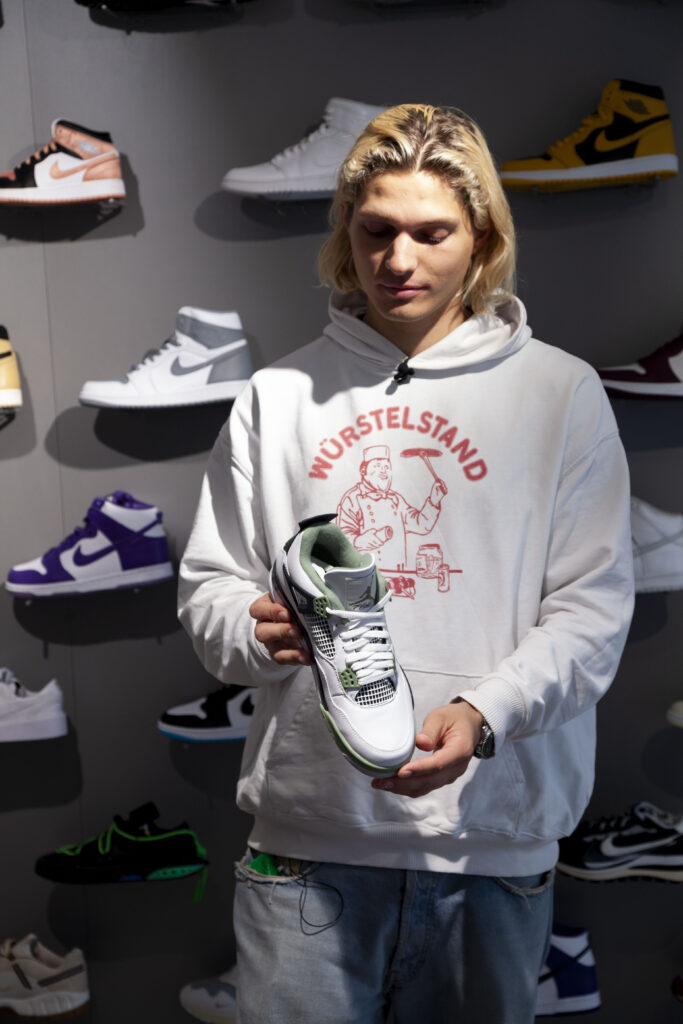
FAB: Sustainability and ethical production practises are increasingly important in the fashion industry. How does your brand integrate these values into your distribution process?
Fabian Schumacher: We focus on the products we produce and manufacture. Our manufacturing takes place locally in Europe, and we prioritise quality and fair work environments. However, when it comes to brands like Nike, it’s challenging to influence their manufacturing processes. We acknowledge Nike’s marketing success and appreciate their collaboration with Jordan, but we also recognise that their manufacturing and quality standards could be improved.
Our long-term goal is to create our own sneaker brand, working with the quality standards we stand for. We want to make a positive impact in the sneaker industry and build a reputable name for ourselves.
FAB: I understand you organise clubbing events in Vienna. Can you tell us more about this aspect of your business and how it complements your fashion lifestyle brand?
However, online businesses operate differently, and the profit margins are not as high. It takes a considerable amount of investment to maintain an online presence. Just as we adapted to the online landscape, changes in data laws in Europe affected our advertising performance on platforms like Instagram and Facebook. We had to reorganise once again. And then the Ukrainian-Russian war started, impacting our in-store business due to economic uncertainties.
Fabian Schumacher: Certainly. Vienna, being an old city with a rich history, sometimes lacks the space and opportunities for new ideas, although the youth actively seek them. Our approach is to create unique events and collaborate with creators. For example, if a new streetwear brand wants to celebrate their first release, they reach out to us. Our shop is designed to accommodate parties and events, and we have established partnerships with sponsors like Red Bull and many others. We offer our space, support, and even free drinks to these brands.
This flexibility enables us to make events happen and attract musicians who want to engage with our community. Musicians often approach us to host after-parties, providing our community with an opportunity to meet and chat with them. These events not only enhance the party atmosphere but also boost merchandise sales and strengthen our brand.
FAB: What advice do you have for young entrepreneurs looking to break into the fashion and lifestyle industries?
Fabian Schumacher: The most important thing is to be prepared to take risks and possibly lose some money. When you start manufacturing, the initial products may not be perfect, and there will be challenges. It’s essential to persevere and find ways to make it work. Even if your first T-shirt doesn’t sell out as planned, don’t be discouraged. Keep iterating and improving. With each development project, you gain experience and refine your products.
You never know when an opportunity will arise. Someone may notice and appreciate what you’re doing, leading to collaborations and unexpected success. Remember that the fashion industry is vast, and there are countless possibilities. Just because your initial endeavour didn’t go exactly as planned doesn’t mean you won’t achieve your goals. Get inspired, Lou-Anne Gleißenebner, GNTM Winner, Talks Fashion, Individuality, and Future Goals.
FAB: What can we expect from Fabian and your brand in the future? Any exciting upcoming projects or collaborations you can share?
Fabian Schumacher: While it’s not yet 100 percent confirmed, we’re currently working with a major international brand on our first collaborative merchandise collection. It will receive significant promotion on an international scale, and we’re producing around two thousand five hundred pieces for the summer collection. We plan to introduce it with a grand party that will also elevate the profiles of international musicians.
Additionally, we’re working on manufacturing our own shoes. I have a clear vision of creating high-quality, handmade sneakers in Italy. Although this may take several years to realise, I firmly believe that perseverance is key. We strive to bring products to the market that offer exceptional quality and are produced under wonderful working conditions. That is our ultimate goal.
Fun Zone: #FabFastFive
- FAB: If you could only listen to one song for the rest of your life, what would it be?Fabian: It would be ASAP Rocky and Rural Masa—love sick.
- FAB: If you were stranded on a desert island and could only bring three items, what would they be?
Fabian Schumacher: A soccer ball for sure, and a knife so I can survive. I think a knife is very important. And tent.
- FAB: Tik tok or Instagram?
Fabian: Tik tok.
- FAB: If tours came to Vienna and you were their tour guide, where would be the first place you’d take them?
Fabian: I always start with Stephens Cathedral, and then I make my route to all the wonderful sights we have here because there’s just so much and you can only walk past them.
- FAB: What’s the craziest thing you’ve ever done for love?
Fabian: The craziest thing I’ve ever done for love was when my girlfriend wanted to go on a Greece trip with me, but I didn’t have the time at all, so I worked extra hours and booked myself a flight and a flight back just to spend like twenty-four hours in Greece with her. It was very stressful and not good for the environment, but I just did it for the greater good, and it was a wonderful trip. We drove together on that trip. So I flew a lot around the planet just to spend twenty-four hours with her.
